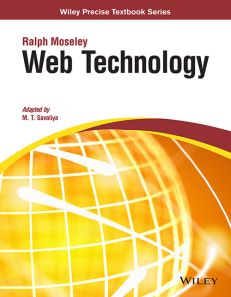Ralph Moseley Web Technology
ISBN: 9788126559510
356 pages
For more information write to us at: acadmktg@wiley.com

Description
This book is intended to respond to the growing needs of knowing wide range of Web technologies by the students of Computer Science / Engineering and Information Technology. The approach taken is to provide the students with integrated view of Web technologies and tools to develop the Web applications by using appropriate combinations elaborated nicely throughout the book. This book covers the Web design concepts and Web development technologies from both conceptual and syntactical aspects that include HTML, XHTML, CSS, JavaScript, XML, PHP and MySQL.
Dedication
Preface to This Edition
Preface to the Original Edition
Chapter 1 The Way the Web Works
1.1 History
1.2 The Internet and the WWW
1.3 Protocols and Programs
1.4 Review of HTTP
1.5 Secure Connections
1.6 Applications and Development Tools
1.7 The Web Browser
1.8 What is a Server?
1.9 Server Choices
1.10 Setting up Servers
1.11 Web 2.0
Chapter 2 Designing an Effective Web Site
2.1 Introduction
2.2 Web Site Design Issues
2.3 Planning a Web Site
2.4 Navigation
Chapter 3 The Client Side: HTML
3.1 Introduction
3.2 The Development Process
3.3 Basic HTML
3.4 Formatting and Fonts
3.5 Commenting Code
3.6 Color
3.7 Hyperlinks
3.8 Lists
3.9 Tables
3.10 Images
3.11 Simple HTML Forms
3.12 Web Site Structure
Chapter 4 From HTML to XHTML
4.1 More History, More Standards
4.2 The Move to XHTML
4.3 Meta Tags
4.4 Character Entities
4.5 Frames and Framesets
4.6 HTML 5: Overview and Features
Chapter 5 Getting Some Style: CSS
5.1 The Need for CSS
5.2 Introduction to CSS
5.3 Basic Syntax and Structure
5.4 Using CSS
5.5 Background Images, Colors and Properties
5.6 Manipulating Text
5.7 Using Fonts
5.8 Borders and Boxes
5.9 Margins
5.10 Padding
5.11 Lists
5.12 Positioning Using CSS
5.13 CSS2
5.14 CSS3: Overview and Features
Chapter 6 JavaScript: Introduction to Client Side Scripting
6.1 What is JavaScript?
6.2 How to Develop JavaScript
6.3 Simple JavaScript
6.4 Variables
6.5 Functions
6.6 Conditions
6.7 Loops and Repetition
6.8 JavaScript Popup Boxes
6.9 JavaScript and HTML
Chapter 7 JavaScript: Developing More Advanced Scripts
7.1 JavaScript and Objects
7.2 JavaScript’s Own Objects
7.3 The DOM and the Web Browser Environment
7.4 Forms and Validation
Chapter 8 DHTML
8.1 Combining HTML, CSS and JavaScript
8.2 Events and Buttons
8.3 Controlling Your Browser
Chapter 9 XML: Extensible Markup Language
9.1 Introduction to XML
9.2 The Many Uses of XML
9.3 Simple XML
9.4 XML Key Components
9.5 Document Type Definitions and Schemas
9.6 Well Formed?
9.7 Using XML with Applications
Chapter 10 XML, XSL and XSLT: Transforming XML
10.1 Introducing XSL
10.2 XML Transformed
10.3 A Simple Example
10.4 XSL Elements
10.5 Transforming with XSLT
Chapter 11 PHP 1: Starting to Script on the Server Side
11.1 Starting to Script with PHP
11.2 Variables
11.3 Getting Some Input
11.4 Decisions
11.5 Looping
11.6 Examples
Chapter 12 PHP 2: Arrays, Functions and Forms
12.1 Arrays
12.2 Functions
12.3 Browser Control
12.4 Browser Detection
12.5 String Manipulation with PHP
12.6 Files
12.7 Passwords
12.8 Email
12.9 Uploading
12.10 Examples
Chapter 13 More Advanced PHP
13.1 Further File Handling
13.2 Cookies
13.3 Sessions
13.4 Mobile Technologies
13.5 Other Advanced PHP Features
13.6 Object-Oriented Programing
13.7 Examples
Chapter 14 Using MySQL Database with PHP
14.1 Introduction
14.2 Relational Databases
14.3 SQL
14.4 Basic Commands with PHP Examples
14.5 Database Examples using PHP
14.6 phpMyAdmin
14.7 Database Bugs
14.8 Examples
Summary
Key Words and Phrases
Multiple-Choice Questions
Review Questions
Practice
Chapter Quiz
Useful Web Addresses
Answers
Solved Paper I (2014)
Solved Paper II (2015)

